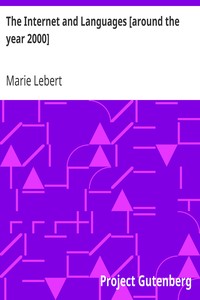The Internet and Languages [around the year 2000] by Marie Lebert
"The Internet and Languages" by Marie Lebert is a scholarly exploration of the dynamic intersection between the internet and linguistic diversity, written in the late 20th century. The work investigates how the internet has evolved from an English-centric medium to a more multilingual platform, encompassing various languages and communities across the globe. It addresses themes of linguistic democracy, the challenges faced by minority languages, and the development of technology that supports this
multilingual growth online. At the start of the book, Lebert outlines the rapid evolution of the internet and its implications for language use. The introductory section sets the stage by discussing how, as of mid-2000, non-English speakers constituted a significant percentage of internet users, prompting a need for greater representation of diverse languages online. It emphasizes the concept of "Language Nations," groups of internet users who share a common language, and discusses the importance of "mother-tongue surfing" as a metaphor for achieving equal access for all users, regardless of their language background. Moreover, it highlights various initiatives aimed at promoting online multilingualism, from early projects to localization efforts and machine translation technologies. (This is an automatically generated summary.)
Read or download for free
| Reading Options | Url | Size | |||
|---|---|---|---|---|---|
| Read now! | https://www.gutenberg.org/ebooks/30422.html.images | 161 kB | |||
| EPUB3 (E-readers incl. Send-to-Kindle) | https://www.gutenberg.org/ebooks/30422.epub3.images | 133 kB | |||
| EPUB (older E-readers) | https://www.gutenberg.org/ebooks/30422.epub.images | 133 kB | |||
| EPUB (no images, older E-readers) | https://www.gutenberg.org/ebooks/30422.epub.noimages | 116 kB | |||
| Kindle | https://www.gutenberg.org/ebooks/30422.kf8.images | 291 kB | |||
| older Kindles | https://www.gutenberg.org/ebooks/30422.kindle.images | 281 kB | |||
| Plain Text UTF-8 | https://www.gutenberg.org/ebooks/30422.txt.utf-8 | 146 kB | |||
| Download HTML (zip) | https://www.gutenberg.org/cache/epub/30422/pg30422-h.zip | 131 kB | |||
| There may be more files related to this item. | |||||
Similar Books
About this eBook
| Author | Lebert, Marie |
|---|---|
| Title | The Internet and Languages [around the year 2000] |
| Credits | Produced by Al Haines |
| Reading Level | Reading ease score: 41.8 (College-level). Difficult to read. |
| Language | English |
| LoC Class | TK: Technology: Electrical, Electronics and Nuclear engineering |
| Subject | Internet |
| Subject | Language and languages |
| Subject | World Wide Web |
| Category | Text |
| EBook-No. | 30422 |
| Release Date | Nov 8, 2009 |
| Most Recently Updated | Oct 24, 2024 |
| Copyright Status | Copyrighted. Read the copyright notice inside this book for details. |
| Downloads | 794 downloads in the last 30 days. |
| Project Gutenberg eBooks are always free! | |

